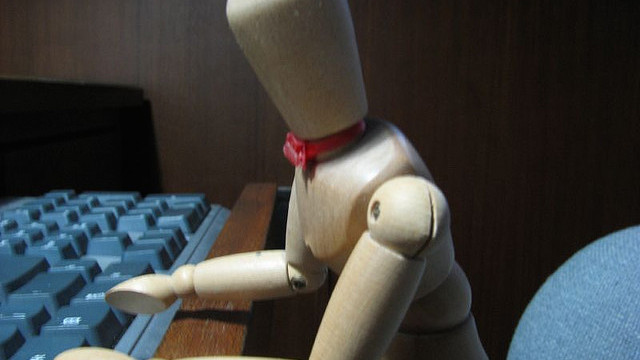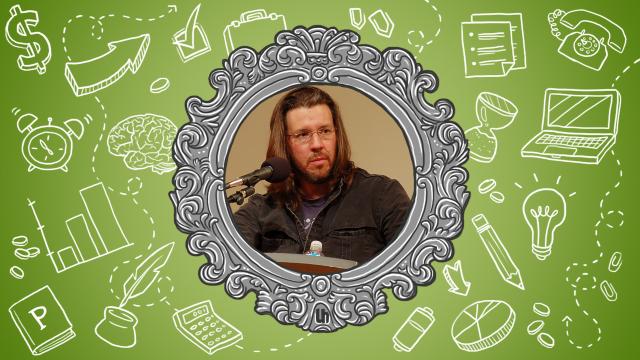David Foster Wallace committed suicide in 2008 at the age of 46, but he is considered to be one of the most productive and interesting writers of the 21st century. Let’s take a look at how he did it.
Pictures: Steve Rhodes, JulyYu
David Foster Wallace’s most recognised work was Infinite Jest, but he was just as accomplished as an essayist. In many of his essays, books and speeches, he laid out his own thoughts on living productively. More importantly, he was open about his own failures and struggles, which makes learning from him easier.
Remember that Work-Life Balance Is Difficult for Everyone

We talk a lot about the importance of work-life balance, but it’s difficult to master. DFW knew that all too well and talked about his own struggles with balance. We like to think that productive writers have this figured out, but it’s pretty clear that DFW never did. In one of his journals, he attempted to figure out what balance would look like in his life:
What balance would look like
2-3 hours a day in writing
Up at 8-9
Only a couple late nights a week
Daily exercise
Minimum time spent teaching
2 nights/week spent w/other friends
5 AA/week Church
Writing to author Don DeLillo, DFW expressed his continued struggle with the idea of routine and balance:
Do you have like a daily writing routine? Do you set of certain intervals as all and only time for fiction writing? More important, do you then honour that daily obligation, day after day? Do you have difficulties with procrastination/avoidance/lack of discipline? If so, how do you overcome them? I ask because I’m frustrated not just with the slowness of my work but with the erratic pace I work at. And I ask you only because you seem at least on this end of the books, to be so steady — books every couple or so years for over two decades and you don’t seem to have an outside job or teaching gi or anything that might relieve (what I find to be) the strain of daily self-starting and self-discipline and daily temptation to dick around and abandon the discipline. Any words or tips would be appreciated and kept in confidence.
And in an interview with Dave Eggers in the Believer, he continues on with his struggle:
The point being that I mostly work at home now, although I know I’d work better, faster, more concentratedly if I went someplace else. If work is going shitty, I try to make sure that at least a couple hours in the morning are carved out for this disciplined thing called Work. If it’s going well, I often work in the p.m. too, although of course if it’s going well it doesn’t feel disciplined or like uppercase Work because it’s what I want to be doing anyway. What often happens is that when work goes well all my routines and disciplines go out the window simply because I don’t need them, and then when it starts not going well I flounder around trying to reconstruct disciplines I can enforce and habits I can stick to. Which is part of what I meant by saying that my way of doing it seems chaotic, at least compared to the writing processes of other people I know about (which now includes you).
Of course, despite all that, David Foster Wallace was incredibly productive and continued to write constantly over the years. Work-life balance is incredibly important. Routines are great for people. But they’re different for everyone. Wallace was constantly trying to find what worked best for himself but was also comparing that routine to others. In the end, it seems like he never really found a routine that worked, but his failure might have just been in where he was looking.
Don’t Let Yourself Get Too Comfortable
It’s easy to get complacent at a job or craft. After years and years of practice, you eventually hit a plateau where you’re comfortable, your job is easy and you can coast along. If that happens, you’re not improving though, and that starts to cause problems. DFW describes this in Infinite Jest:
“Then [there’s] maybe the worst type, because it can cunningly masquerade as patience and humble frustration. You’ve got the Complacent type, who improves radically until he hits a plateau, and is content with the radical improvement he’s made to get to the plateau, and doesn’t mind staying at the plateau because it’s comfortable and familiar, and he doesn’t worry about getting off it, and pretty soon you find he’s designed a whole game around compensating for the weaknesses and chinks in the armour the given plateau represents in his game, still — his whole game is based on this plateau now.
And little by little, guys he used to beat start beating him, locating the chinks of the plateau, and his rank starts to slide, but he’ll say he doesn’t care, he says he’s in it for the love of the game, and he always smiles but there gets to be something sort of tight and hangdog about his smile, and he always smiles and is real nice to everybody and real good to have around but he keeps staying where he is while other guys hop plateaux, and he gets beat more and more, but he’s content.”
This is to say that it’s good to break out of your comfort zone and try new things. It’s also important to recognise when you’re on autopilot. Author Joshua Foer calls this the “OK Plateau” and has a set of four principles to break out of it:
- Operate outside of your comfort zone and study yourself failing.
- Try to walk in the shoes of someone who is more confident than you.
- Seek out critical and immediate feedback.
- Treat what you do like a science (test, hypothesise, theorise).
If you find yourself coasting along, remind yourself to try some new things and don’t be afraid to fail.
Quit Trying to Be Perfect
Perfectionism keeps you from doing a lot of things and when you’re constantly trying to make something perfect, you’re missing out on a lot. DFW explains his own struggles with perfectionism in an interview on WNYC:
You know, the whole thing about perfectionism. The perfectionism is very dangerous, because of course if your fidelity to perfectionism is too high, you never do anything. Because doing anything results in — It’s actually kind of tragic because it means you sacrifice how gorgeous and perfect it is in your head for what it really is.
We’ve talked about the problem with perfection before. As DFW points out, it often leads to procrastination, but you can fight back with a little preparation. That said, like a lot of psychological tricks, it’s more about recognising your own behaviour and working to fix it on your own.
Understand Your Biases
David Foster Wallace’s 2005 commencement speech at Kenyon College gets cited a lot for various reasons, but its main appeal here is how it outlines Wallace’s life. Wallace wanted students to take away the idea that self-reflection, attention, and self-awareness of your biases is important:
The point is that petty, frustrating crap like this is exactly where the work of choosing comes in. Because the traffic jams and crowded aisles and long checkout lines give me time to think, and if I don’t make a conscious decision about how to think and what to pay attention to, I’m going to be pissed and miserable every time I have to food-shop, because my natural default-setting is the certainty that situations like this are really all about me, about my hungriness and my fatigue and my desire to just get home, and it’s going to seem, for all the world, like everybody else is just in my way, and who are all these people in my way? And look at how repulsive most of them are and how stupid and cow-like and dead-eyed and nonhuman they seem here in the checkout line, or at how annoying and rude it is that people are talking loudly on cell phones in the middle of the line, and look at how deeply unfair this is: I’ve worked really hard all day and I’m starved and tired and I can’t even get home to eat and unwind because of all these stupid g-d- people…
If you’re automatically sure that you know what reality is and who and what is really important — if you want to operate on your default-setting — then you, like me, will not consider possibilities that aren’t pointless and annoying. But if you’ve really learned how to think, how to pay attention, then you will know you have other options. It will actually be within your power to experience a crowded, loud, slow, consumer-hell-type situation as not only meaningful but sacred, on fire with the same force that lit the stars — compassion, love, the sub-surface unity of all things. Not that that mystical stuff’s necessarily true: The only thing that’s capital-T True is that you get to decide how you’re going to try to see it. You get to consciously decide what has meaning and what doesn’t. You get to decide what to worship…
Of course, we have all kinds of biases that affect everything from how we shop to how we interpret love. It’s next to impossible to recognise every one you have, but that doesn’t mean it’s not worth trying. You do get a choice, and Wallace suggests you at least attempt to confront most of those biases.

Comments